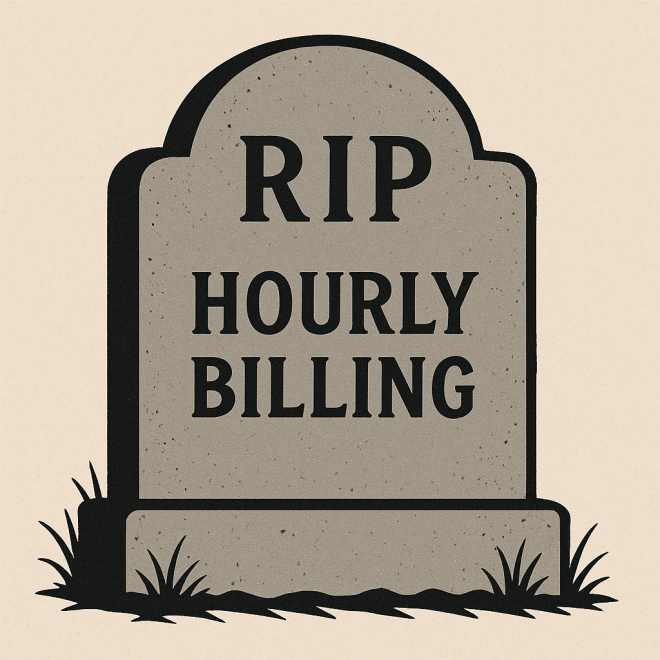Will AI finally kill hourly pay in PR?

For decades, public relations firms have found reasons to justify charging by the hour. “Precision” is the most common one, along with the claim that hourly tracking proves real work was done to achieve a client’s goals.
But hourly-based billing also punishes the best performers, rewards the least productive, and incentivizes tension, wasted time, and dishonesty. It’s a system based on time, not value.
It’s always been a broken model. And on a recent Cracking the Comms Code panel, Proven Media Solutions founder Dustin Siggins, Gregory FCA founder Greg Matusky, and SKDK Managing Director Mark DeVito explained how AI may finally finish it off for good.
Why hourly billing is flawed
Hourly billing operates on a simple principle: time equals value. But what about the brilliant idea that arrives in the shower or on a bike ride? What about the one great email that lands a major placement, compared to the ten mediocre ones that go nowhere?
Under the hourly model, the person who sends more emails gets paid more, even if the results are worse. The efficient, knowledgeable practitioner — the one who knows what not to do — ends up being paid less.
It also drains management’s time. Project billing means sending a straightforward invoice for the agreed-upon scope of work. Hourly billing means tracking every minute, verifying every line, and building an algebraic equation just to justify the bill.
It’s exhausting and highly inefficient. And in the era of AI, that inefficiency is even harder to defend. Firms that invest in people, systems, and processes can now produce high-quality content not in days or weeks, but in minutes and hours.
Experience proves value matters more than time
Mark DeVito has lived both sides of the billing debate. Early in his career, agency life revolved around time tracking, budgets, and statements of work measured in six-minute increments. The system created discipline — but it also limited creativity.
Over time, he realized clients didn’t want hours. They wanted partnership. The best campaigns came from collaboration and flexibility, not rigid timekeeping. When agencies are free to focus on discovery — understanding a client’s goals, audiences, and risks — they build more effective strategies.
That discovery process doesn’t fit neatly into a timesheet. It depends on trust and senior judgment — exactly what hourly billing discourages. Value-based relationships, by contrast, let agencies spend their energy defining success rather than defending invoices.
AI makes that shift even more critical. While machines can generate drafts or surface insights, they can’t guide tone, weigh reputational risk, or make judgment calls under pressure. Clients still rely on the human side of communications — the experience and intuition that no algorithm can replicate.
Creating quality content faster
The same truth applies to content creation. At Proven Media Solutions, the team recently saw how AI magnifies value-based work when a client needed five authors secured — and op-eds written and placed for each one — under a tight deadline.
Before AI, that assignment would have taken several days and multiple team members working late nights. With AI integrated into the workflow, each first draft took about twenty minutes. The team then ran its standard editing, fact-checking, and approval process. The result: five polished op-eds delivered in half the time — and a client who saw the value of speed without sacrificing quality.
Under hourly billing, that efficiency would have reduced revenue. Under value-based pricing, it generated bonuses from the client.
Great AI outcomes require smart investments
Not all AI adoption looks the same. Many assume AI-generated content means generic outputs — the kind that read like someone simply pasted a prompt into ChatGPT and hit send. But firms that invest strategically in AI are already proving the opposite.
Gregory FCA, for instance, trained its entire team on AI tools and rebuilt internal workflows from the ground up. The payoff: a 13% increase in revenue per employee. The firm also invested $100,000 to develop Crisis Calm, a proprietary AI platform that produces full-scale crisis response plans in minutes.
The platform guides communicators through tone, stakeholders, risk levels, and messaging — delivering holding statements, talking points, and letters to regulators in a fraction of the time it once took.
That speed doesn’t cheapen the work — it enhances it. Hourly billing would punish producing weeks of crisis strategy in minutes. Under value-based billing, that innovation is rewarded.
The bottom line
AI has ended any illusion that time equals value. The old hourly billing model never made sense, and now its flaws are undeniable. AI has killed it, creating more value for everyone – clients and practitioners alike.
See the entire discussion about how AI is killing hourly billing below.

